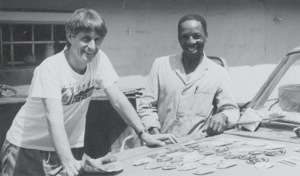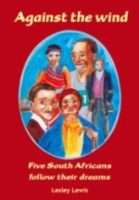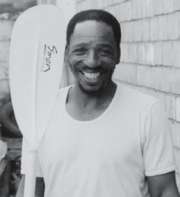Simon Mkhize is a sportsman. He was the first black runner to get a green number for running the Comrades Marathon ten times. The Comrades Marathon is a race which is eighty kilometres long, and it is one of the most difficult races in the world to run. If a runner manages to finish it ten times in less than eleven hours, he or she is given a green number. This is a great honour.
But Simon had not only run the race ten times when he got his green number. He had run it sixteen times. Blacks were only allowed to run officially in 1975. Before 1975 Simon ran the race six times. But he never got a medal at the end of those races, because he was not an official runner.
He was not white.
In 1973 a white runner, John Morrison, collected medals from other whites and gave them to the black runners to protest against the ‘whites only’ rule. They wanted to show the organisers that they were very unhappy about the ‘whites only’ rule. Now Simon has run the Comrades Marathon fourteen times officially, and twenty times altogether, and he has got five silver medals and nine bronze medals. His best time is six and a half hours.
Simon was born on the 4th of March 1942 near Howick, and he has five sisters and three brothers.
His father was a farmer. When Simon was about twelve years old, the family moved to Underberg. Simon worked on a farm which belonged to a white farmer, and he earned about fifteen shillings a month. He also spent a lot of time playing with the son of the farmer. Together they rode horses and swam in the rivers.
He started running when he was twenty-eight. At that time he was working at Scottish Cables in Pietermaritzburg. A friend made a bet with Simon that he could beat him in a race. So Simon started training for this race with his friend. The friend noticed that Simon could run quite fast, and decided not to race him.
Then, another friend said he could beat him with his bicycle. They made a R3.00 bet. So his friend rode his bicycle from Scottish Cables to Mbali, and Simon ran. But Simon took shortcuts through the bush, and his friend had to stick to the road.
Simon won the race, but he gave his friend R1.00 back, because he used shortcuts.
After this race, Simon found out that he couldn’t stop running. He just liked it so much. Another runner, Theo Miller, saw him running one day, and he became Simon’s trainer. So Simon started entering races, and winning them. The first race he ran in he won, and he won the next race too. Then he entered a race which was fifteen miles long — from Albert Falls to Northdale Stadium in Pietermaritzburg. He won that race three times in a row. He laughed and said, “Every year I had to bring the trophy and take it home, bring the trophy and take it home, bring the trophy and take it home.” His nickname became Uhlanya, which means madman. People would shout this at him as he ran past: “Uhlanya!“ He made friends through running, and they said he must run the ‘Comrades’. So he ran it, but he didn’t know it was such a long race. He was used to short races. He had to get food and drink from other runners, because he didn’t take his own.
The people on the side of the road were very pleased to see Simon and the other black runners running in the race, and cheered them on. They knew they weren’t official runners, and that they wouldn’t get medals at the end of the race. There were also lots of posters saying, “Open Comrades to Blacks now”.
Simon also found out that he liked other sports. Greg Bennet, a canoeist, met Simon. “He pushed me to canoe,” said Simon. “I said, I can’t.” He said, “Come on,” and took Simon to Albert Falls Dam. That was a Saturday, and it was Simon’s first time in a canoe.
On Sunday he had to be in a race. He had to sit with another person in a canoe, and he had to try very hard not to fall over, because a canoe is such a long, narrow boat.
Now he has been in the ‘Dusi’ canoe race seven times. He was the first black person to take part in this race. You have to paddle a canoe all the way from Pietermaritzburg, down the Msunduze River, to Durban. It takes about three days to get to Durban.
To get energy for this race Simon eats samp, maas and beans. He also eats a mixture of Pronutro (he calls it sawdust), raw egg and orange juice.
But Simon didn’t stop there. He has also tried mountain-climbing using ropes, and going down the Mkhomazi River in a small rubber boat. This is called rafting, and it is his favourite sport at the moment. He wants to see more black canoeists and rafters. “You must know how to pull water,” he says. “But it is very important to know how to swim if you do these sports, and it is difficult for black children to learn how to swim if there are no swimming pools in the townships.”

Simon Mkhize and John Morrison look at all Simon’s medals and badges. He still has the silver medal which John gave him nearly twenty years ago.
Simon has one son called David. David has also run the ‘Comrades’, and next year father and son will run against each other. Simon says he will only give up running when his grandchild is old enough to say to his friends, “You see that man running there? That is my grandfather!”
Simon has his own business in Pietermaritzburg repairing chainsaws. His dream is to go back to farming in the Boston area. He already owns a few cows, and he looks forward to the day when he can get some land.
****
This article, together with a picture of Mkhize and Gono, appeared in the Daily News, June 2, 1973.
Whites give medals to Black Comrades
Daily News Reporter
THE FIRST TWO African runners to complete the Comrades Marathon yesterday received a gold and silver medal from former Comrades runners.
Zwelitsha Gono, a 21 year-old student teacher from the Indaleni Art School at Richmond, who was the first unofficial runner to cross the finishing line received the gold medal, while Simon Mkhize got the silver medal.
Mr John Morrison, a Comrades veteran from Pietermaritzburg, who presented the medals to the non-white athletes, said yesterday that he had collected seven silver medals and a gold from former Comrades runners.
Mr Morrison said that he was sick of the attitude of the organisers in keeping non-Whites out of the Comrades as official runners. Mr Morrison attacked the chairman of the Comrades Marathon Committee, Mr A.S. Bendzulia, for his attitude toward the non-White runners.
“How can he say that it is only a club event when athletes from New Zealand and England have taken part in the race? “The marathon is one of the greatest road races in the world, and I think it is a disgrace that non-Whites are not regarded as official participants,” he said.
****
This article appeared in the Natal Witness, May 30, 1974
BLACKS ARE IN THE BIG EVENT
Staff Reporter
ALTHOUGH the Comrades Marathon is officially an “all White” race, there have been unofficial entries from two Black runners who both ran in last year’s race.
Simon Mkhize (32), who is a gardener at the University of Natal, Pietermaritzburg, will be running for the fifth time, but this time wearing university colours.
Last week Mkhize came seventh in the university’s 20km race in a time of 1 hour, 18 minutes, 48 seconds, as well as in the 56km race at Botha’s Hill recently. He has been training for the big race with Collegian Harriers and Varsity runners.
A 22 year-old student teacher from the Ndaleni Art School at Richmond, Zwelitsha Gono, was the first unofficial runner to cross the finishing line last year.
Yesterday he said he had not been training very hard but was still going to run “as the up-run is in my favour because I like the steep roads”.
Both Mkhize and Gono finished last year’s Comrades Marathon in just under seven hours.



